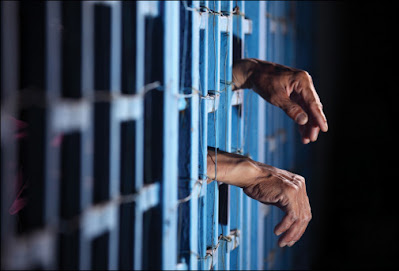By: Ranier Simons, ADAP Blog Guest Contributor
Science and equity slowly continue to push policy forward. On May 21, 2025, Maryland became the fifth state to decriminalize HIV. In February 2025, Maryland Senate Bill 356 and House Bill 39 passed in their respective chambers. On May 21, Governor Wes Moore signed the legislation into law with the official name, ‘The Carlton R. Smith Act’. Carlton R. Smith was an activist, long-term HIV survivor, and advocate championing Baltimore LGBTA and HIV services (Bishop, 2024; Medina, 2024). He passed away in May 2024, and as an active proponent of this legislation, it was fitting to name it after him. The effective date of the legislation is October 1, 2025.
 |
| Photo Source: CHLP |
The act repeals the previous law, which consisted of two concise sections:
- (a) An individual who has the human immunodeficiency virus may not knowingly transfer or attempt to transfer the human immunodeficiency virus to another individual.
- (b) A person who violates the provisions of this section is guilty of a misdemeanor and, on conviction, is subject to a fine not exceeding $2,500 or imprisonment not exceeding 3 years or both.
HIV criminalization means criminalizing living with HIV by criminalizing behavior that is not commonly criminalized when a person is HIV-negative. It also means adding enhanced punitive actions for a crime to those living with HIV convicted of a crime, more than the punishment if HIV was not involved (CHLP, 2025 May). The Maryland legislation was inherently problematic because it did not specify the means of transmission, did not require actual, verified transmission of the virus, and did not require any proof of intent. It merely needed someone to ‘knowingly’ expose another person to HIV (Cisneros et al., 2024). Additionally, it carved out HIV from general health statutes surrounding the spreading of other communicable diseases, adding a misdemeanor, monetary fine, and a maximum three-year imprisonment term (Cisneros et al., 2024).
The repealed Maryland statute was discriminatory regarding HIV status and race. From 2020-2022, enforcement of HIV criminalization laws was heavily concentrated in predominantly Black counties: 32% of the state's cases were in Baltimore City, 19% in Montgomery County, and 18% in Prince George’s County (Cisneros et al., 2024). Additionally, Black Marylanders were only 30% of the state's population and 71% of PLWHA, but they accounted for 82% of all HIV-related cases (Cisneros et al., 2024).
The Maryland statute ignored scientific evidence, which shows that a person with an undetectable viral load cannot transmit the virus. It also did not give any weight to a person living with HIV who disclosed their status or received consent from the other party (Cisneros et al., 2024). Thus, the latitude of defining actions as ‘knowledgeable exposure’ was predatorily wide.
 |
| Photo Source: The 19th |
According to the Center for HIV Law and Policy (CHLP), in the United States, 32 states currently have HIV-specific criminalization laws, and 28 have HIV-related criminal penalty enhancements (CHLP, 2025 February). Additionally, some states have general statute criminal laws that allow HIV to be prosecuted in terms of assault with a deadly weapon or reckless endangerment. These laws are fundamentally not evidence-based because HIV cannot be transmitted through spitting, biting, fighting, or throwing bodily fluids. Outdated laws contribute to the stigma and reinforce opinions that contradict current medical science.
In March of this year, North Dakota also got rid of its HIV criminalization laws. Before repeal, N.D. Cent. Code § 12.1-20-17 stated that PLWHA could be prosecuted for having sex if they did not disclose their status, even if the activity was low risk or posed no risk at all, such as with oral sex. The penalties for conviction were up to 20 years in prison and a Class A felony conviction. Additionally, people who shared syringes or needles without proper sterilization could have been prosecuted even without intent to transmit or any verified actual infection, as well as qualify for the same maximum 20-year imprisonment penalty and felony classification.
HIV criminalization laws do not benefit or improve public health or safety. In fact, HIV criminalization laws make people fearful of getting tested, seeking care, or even disclosing when undetectable and in treatment. It is imperative to continue to educate legislators as well as the public. It is unacceptable to allow these laws to keep PLWHA tangled in the justice system unduly, demoralize their existence, and continue to marginalize and disenfranchise racial and sexual minoritized groups.
[1] Bishop, K. (2024, June 6). Remembering Carlton Smith. Retrieved from https://chasebrexton.org/blog/remembering-carlton-smith
[2] Center For HIV Law and Policy (CHLP). (2025, February). Mapping HIV Criminalization Laws in the U.S., CHLP (2025). Retrieved from https://www.hivlawandpolicy.org/maps#:~:text=In%20the%20United%20States%2C%2032,knowledge%20of%20their%20HIV%20status.
[3] Center For HIV Law and Policy (CHLP). (2025, May 20). Maryland Repeals HIV Criminalization Law. Retrieved from https://hivlawandpolicy.org/news/maryland-repeals-hiv-criminalization-law
[4] Cisneros, N., Tentindo, W., Sears, B., Macklin, M., Bendana, D. (2024, January). Enforcement of HIV Criminalization in Maryland. Retrieved from https://williamsinstitute.law.ucla.edu/wp-content/uploads/HIV-Criminalization-MD-Jan-2024.pdf
[5] Medina, J. (2024, June 24). The Life and Work of Carlton Smith. Retrieved from https://www.freestate-justice.org/the-life-and-work-of-carlton-smith
Disclaimer: Guest blogs do not necessarily reflect the views of the ADAP Advocacy Association, but rather they provide a neutral platform whereby the author serves to promote open, honest discussion about public health-related issues and updates.



